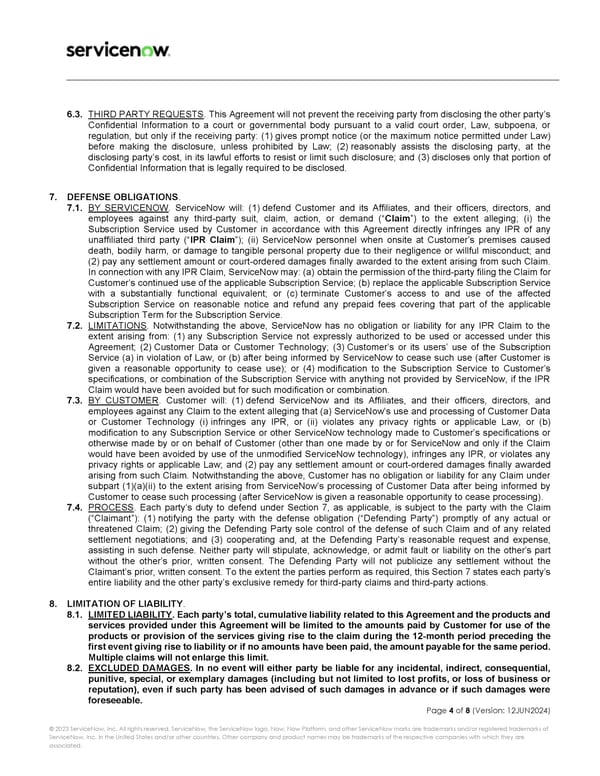6.3. THIRD PARTY REQUESTS. This Agreement will not prevent the receiving party from disclosing the other party’s Confidential Information to a court or governmental body pursuant to a valid court order, Law, subpoena, or regulation, but only if the receiving party: (1) gives prompt notice (or the maximum notice permitted under Law) before making the disclosure, unless prohibited by Law; (2) reasonably assists the disclosing party, at the disclosing party’s cost, in its lawful efforts to resist or limit such disclosure; and (3) discloses only that portion of Confidential Information that is legally required to be disclosed. 7. DEFENSE OBLIGATIONS. 7.1. BY SERVICENOW. ServiceNow will: (1) defend Customer and its Affiliates, and their officers, directors, and employees against any third-party suit, claim, action, or demand (“Claim”) to the extent alleging; (i) the Subscription Service used by Customer in accordance with this Agreement directly infringes any IPR of any unaffiliated third party (“IPR Claim”); (ii) ServiceNow personnel when onsite at Customer’s premises caused death, bodily harm, or damage to tangible personal property due to their negligence or willful misconduct; and (2) pay any settlement amount or court-ordered damages finally awarded to the extent arising from such Claim. In connection with any IPR Claim, ServiceNow may: (a) obtain the permission of the third-party filing the Claim for Customer’s continued use of the applicable Subscription Service; (b) replace the applicable Subscription Service with a substantially functional equivalent; or (c) terminate Customer’s access to and use of the affected Subscription Service on reasonable notice and refund any prepaid fees covering that part of the applicable Subscription Term for the Subscription Service. 7.2. LIMITATIONS. Notwithstanding the above, ServiceNow has no obligation or liability for any IPR Claim to the extent arising from: (1) any Subscription Service not expressly authorized to be used or accessed under this Agreement; (2) Customer Data or Customer Technology; (3) Customer’s or its users’ use of the Subscription Service (a) in violation of Law, or (b) after being informed by ServiceNow to cease such use (after Customer is given a reasonable opportunity to cease use); or (4) modification to the Subscription Service to Customer’s specifications, or combination of the Subscription Service with anything not provided by ServiceNow, if the IPR Claim would have been avoided but for such modification or combination. 7.3. BY CUSTOMER. Customer will: (1) defend ServiceNow and its Affiliates, and their officers, directors, and employees against any Claim to the extent alleging that (a) ServiceNow’s use and processing of Customer Data or Customer Technology (i) infringes any IPR, or (ii) violates any privacy rights or applicable Law, or (b) modification to any Subscription Service or other ServiceNow technology made to Customer’s specifications or otherwise made by or on behalf of Customer (other than one made by or for ServiceNow and only if the Claim would have been avoided by use of the unmodified ServiceNow technology), infringes any IPR, or violates any privacy rights or applicable Law; and (2) pay any settlement amount or court-ordered damages finally awarded arising from such Claim. Notwithstanding the above, Customer has no obligation or liability for any Claim under subpart (1)(a)(ii) to the extent arising from ServiceNow’s processing of Customer Data after being informed by Customer to cease such processing (after ServiceNow is given a reasonable opportunity to cease processing). 7.4. PROCESS. Each party’s duty to defend under Section 7, as applicable, is subject to the party with the Claim (“Claimant”): (1) notifying the party with the defense obligation (“Defending Party”) promptly of any actual or threatened Claim; (2) giving the Defending Party sole control of the defense of such Claim and of any related settlement negotiations; and (3) cooperating and, at the Defending Party’s reasonable request and expense, assisting in such defense. Neither party will stipulate, acknowledge, or admit fault or liability on the other’s part without the other’s prior, written consent. The Defending Party will not publicize any settlement without the Claimant’s prior, written consent. To the extent the parties perform as required, this Section 7 states each party’s entire liability and the other party’s exclusive remedy for third-party claims and third-party actions. 8. LIMITATION OF LIABILITY. 8.1. LIMITED LIABILITY. Each party’s total, cumulative liability related to this Agreement and the products and services provided under this Agreement will be limited to the amounts paid by Customer for use of the products or provision of the services giving rise to the claim during the 12-month period preceding the first event giving rise to liability or if no amounts have been paid, the amount payable for the same period. Multiple claims will not enlarge this limit. 8.2. EXCLUDED DAMAGES. In no event will either party be liable for any incidental, indirect, consequential, punitive, special, or exemplary damages (including but not limited to lost profits, or loss of business or reputation), even if such party has been advised of such damages in advance or if such damages were foreseeable. Page 4 of 8 (Version: 12JUN2024) © 2023 ServiceNow, Inc. All rights reserved. ServiceNow, the ServiceNow logo, Now, Now Platform, and other ServiceNow marks are trademarks and/or registered trademarks of ServiceNow, Inc. in the United States and/or other countries. Other company and product names may be trademarks of the respective companies with which they are associated.
 Ordering agreement Page 3 Page 5
Ordering agreement Page 3 Page 5